'Clan Of The Cave Bear': Neanderthal Fan Fic
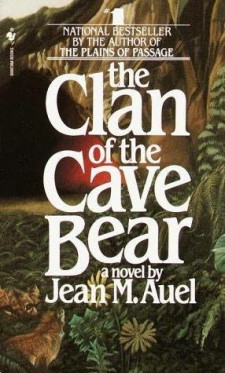
How in the world is it that I am just now reading Clan of the Cave Bear for the first time? Isn’t that wild? I have so much to say about it I could burst. Let’s get one thing straight: we have zero interest in the book’s historical accuracy. As far as plot summary, let’s just go with: “totally totally a legitimate description of a bangin’ Cro-Magnon blonde successfully infiltrating a group of fugly Neanderthals and being all Katniss Everdeen connnnnnnstantly until the World’s Worst Pre-Human boots her out because he’s threatened by powerful women with the ability to verbalize their emotions.” THAT OLD STORY, RIGHT?
Right. When I announced we were doing Clan of the Cave Bear, a reader emailed to reminisce about skimming it as an eleven year old for parts she could masturbate to, which caused me to have a profound personal meditation on how lackluster everyone’s masturbation material was circa 1992. Can you imagine? Young women were masturbating to Clan of the Cave Bear. And then, right, after that email, I assumed there must be some hot stuff, only to discover there’s one sex scene, and it makes Marlon Brando sweating all over Maria Schneider seem like, uh, something you might actually want to masturbate to. Dark days!
Speaking of That Scene, Broud is the worst. Broud is UNBEARABLE. Broud is loathsome. And even though he tries to be all Thug Life, you know who Broud is? Broud is Jan Brady to Ayla’s Marcia. I was already thinking that, and then this happened:
Broud turned his back, clenching his fists, before he could see the compliment Norg paid to the son of Brun’s mate. Ayla, Ayla, Ayla. Everybody is talking about Ayla. You’d think no one did anything at this Clan Gathering except her.
But, really, Ayla is a bit much. Is there anything she can’t do? Anyone (other than Broud) who isn’t captivated at once by her winsome charms and ability to succeed at the weirdest tasks? Clan of the Cave Bear is a little like Neanderthal fan fiction, and Ayla is a classic Mary Sue. She fashions a sports bra for herself from a leather thong! She kills hyenas with a sling and a couple of rocks! She can conceptualize numbers greater than three! She has a male totem! She can easily calculate everyone’s share of the tip when you forget to get separate checks. She changes her own oil, and finds the errors in her own H&R; Block return. It gets old.
Personally, I would have had more respect for Ayla if she’d just killed Broud in his sleep. He’s the only real fly in her ointment, he’s bad to the bone, and he’s barely middle-management material; this is not who you want running the show. You’re a medicine woman: concoct something and put him out of his misery, already. Jean Auel tells us about eighty times that, if you’re a Neanderthal, you’re a senior citizen by 25 — it’s not like anyone’s going to get suspicious. But then there are so many examples in trashy fiction of otherwise bad-ass characters foolishly allowing terrible people to live. Here’s the truth: Gollum was the exception to the rule. For the most part, quietly knifing the sociopaths who stand between you and your goals should be an acceptable solution. At least in primitive hunter-gatherer communities! I’m not suggesting you lure Susie from Accounting into a dark alley because she’s questioning your gas receipts. But can anyone make a good case for not-killing Broud?

About halfway through the novel, I began to have a niggling suspicion that it was secretly written by Dr. Sears as an advertisement for attachment parenting. Babywearing, co-sleeping, natural childbirth, breastfeeding, elimination communication, cross-nursing, baby-led weaning…those are some attached little cave-babies, you know? And when Iza dies and Ayla is all despondent and frumpy and forgets to nurse Durc, there might as well be a BITCH, YOU ARE GOING TO GET MASTITIS sign on her hearth. Sure enough, the ol’ “milk fever” hits, and by the time she’s better, her milk has dried up and Durc is crawling from cave to cave like the Little Matchstick girl, trying to steal nummies from the other ladies. Which they give him, obviously, because their access to Enfamil Gentlease was pretty limited, and they were boiling water with hot stones to make their unpleasant roots and millet palatable.
Sometimes you read books set in the long, long ago, and it seems pretty great. There’s a lot of lying around naked on soft grass, or a permanent and willing underclass helps you do your hair in a variety of fun styles, or men fight each other over your hot self. That is not the case with Clan of the Cave Bear. Not by a long shot. Everything seems sort of cold and dirty and men punch you for addressing them directly, and when you eventually get to trip balls on ergot, it winds up being a real bad scene. I appreciate that. The past sucked, you know?
I KNOW YOU WANT TO TALK ABOUT THIS BOOK. HERE ARE SOME STARTING QUESTIONS!
• No, really, how did I miss this one in early adolescence? Did you know I only read Flowers in the Attic this spring? True story.
• I don’t really get the impression that Cro-Magnons were this attractive, even next to the Neanderthals. Ayla seems a little too Bo Derek for words.
• Was anyone else getting an Anne Shirley/Marilla and Matthew Cuthbert vibe from Ayla’s relationship with Iza and Creb? “All plucky orphans are alike; all miserable orphans are miserable in their own way.”
• Why do we think that Neanderthals would have had names like Iza and Creb? If they had names at all, aren’t Glenn and Wanda just as plausible? They’re Neanderthals, not cats regurgitating hairballs.
• Should I read Valley of the Horses? I was kind of checked out for the last bit, because I have a three-month-old baby and got a little weepy and snivel-y when Broud said she had to leave Durc behind.
• In the days before the Internet, what depressingly marginal works of literature did YOU masturbate to? Or was it more like George Costanza and that issue of Glamour?
• What classic villains should have been taken out by the protagonist way, way before they got their comeuppance?
• There’s an obligatory “using every part of the mammoth” scene. Why is there never a mildly slacker-ish hunter-gatherer community that’s all “you know what, let’s just toss the small intestine?”
• I refuse to believe they didn’t know that babies came from humping. Wouldn’t it have been super-obvious that babies come from humping?

For next time, let’s delve into the Classic Trash sub-category of Books That Have Been Turned Into A Miniseries Starring Richard Chamberlain. The Thorn Birds — let’s do it!
Nicole Cliffe is the proprietress of Lazy Self-Indulgent Book Reviews.
The Ten Kinds Of Hot Guys You Ladies Could Meet in Airports If You Really Wanted To

• Intimidating track-suited Khazak dad; some facial scarring.
• Estonian snowboarder with extra abrasions.
• Stubbly-hot chunky commuter in a bad grey suit and a reverse ring-tan.
• “His leg hair says he’s an adult, but his clothing says he’s 15, probably we should look away now, oh Jesus, is that his mother, or a girlfriend, or what, why does everyone under 26 look like a fetus now?”
• Nervous Indie Chainsmoker (St. Louis-bound).
• Guy whose language you not only don’t speak but can’t actually figure out what it is, but I mean, who cares, it’s not like anybody’s at an airport looking for love, except aren’t we, really?
• Sporty guy telling long and old “good news/bad news” doctor joke to his friends that’s not very funny but at least isn’t at all racist, it could be so much worse!
• Traveling dive team in shortie socks. Which one, which one.
• Matt Saracen.
• Weepy-hot: military home on leave.
Bear Resembles Other Bear
“They seem to look alike — or maybe that’s just wishful thinking. A half-sibling of Knut, the legendary Berlin polar bear who died last year, has just been born in a zoo in Wuppertal, western Germany, and photos of it and its mother Vilma were published on Wednesday.”
Occupy Scandinavia's Long Winter
Occupy Scandinavia’s Long Winter
by Lauren Kirchner
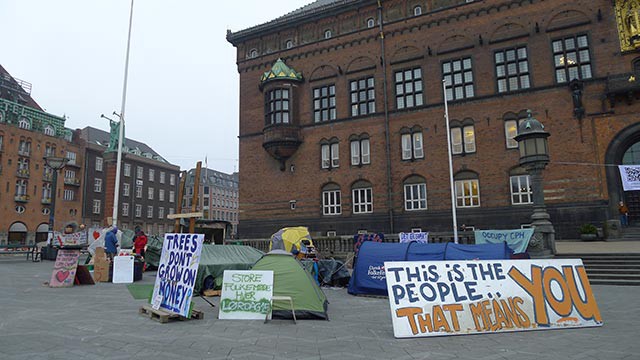
By all accounts, Scandinavia is one of the most prosperous, peaceful and income-equal places to live in the world. Sweden, Finland, Norway and Denmark hold four of the top five spots in the World Democracy Index (the U.S. ranks 15th). The Scandinavian countries are all the way at the top of OECD’s ranking of the happiest countries in the world (the U.S. is 19th), and they’re all the way at the bottom of the CIA’s ranking of countries by income inequality (the U.S. is 40th out of 140).
But when, on October 15, rallies inspired by the Occupy Wall Street movement were held around the world, protesters in these same countries joined in. Everywhere I went in Scandinavia last fall, Occupy sympathizers were setting up camp for the winter. And of course, not only were these some of the most utopian places you can visit — they also happen to be some of the coldest. As I watched the most climactic moments of the Zuccotti Park occupation, 4,000 miles from home and cursing my timing, I wondered: What did these protesters have to complain about? And didn’t they notice it was getting cold out?
I was in Sweden on October 15, when several hundred people gathered in Stockholm’s Sergels torg, a public plaza with a Union Square vibe. Afterwards the protesters all voted on the location for a permanent camp. They chose a grassy triangle of land in the shadow of the Kulturhuset building, the city’s main cultural center.
When I visited the camp, a dozen or so people were set up in a group of small camping tents. One tent was set up with paint, brushes and canvases inside, and another tent was designated for generator-powered cooking. The camp had also just received a military tent from an anonymous donor, which was a huge boon; it was a tent designed with the famously long, dark, and icy Scandinavian winters in mind, making the group’s plan to stay until spring much more realistic. I saw a big sign that said “Vi är inte en handelsvara som ligger i politikers och bankmäns händer,” which means, “We are not a commodity to be held in politicians’ and bankers’ hands.” Another was spray-painted (in English), “Some people are so poor, all they have is money.”
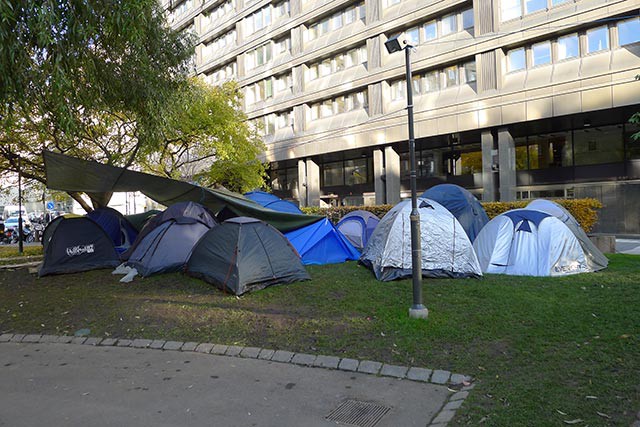


Near the food tent I met a young woman in a bright pink hoodie named Naima Clevenhag. She had wide, earnest eyes, and she ate applesauce as she spoke with me. She told me that she had recently quit her hotel-waitress job because the evening shifts interfered with her political meetings. She said that she and the rest of the occupiers had no plans to leave, and that even though the camp was technically illegal, they hadn’t been bothered by the police at all.
“We’re having a really good relationship with the police, so we can’t look violent, because no one is being violent to us,” she said. “In the US, the police are being violent to the occupants, and that’s why they look violent. But here it’s like, [the police] come here and talk to us, like ‘Are you cold? Do you need anything?’”
We talked about the things that bothered her most, which ranged from homelessness in Stockholm to deregulation brought about by the Glass-Steagall Act in the US. She said some of the other occupiers there were satisfied with the political and economic reality of Sweden, and were, instead, protesting American policies and offer support to Occupy Wall Street. Throughout my stay in Stockholm I had been consistently impressed and by people’s knowledge of the inner workings of the United States, not to mention their flawless English. It humbled me. Before my trip, my knowledge of Sweden was limited to what I could learn by reading Stieg Larsson novels and listening to Robyn, and the only Swedish words I knew were the names of IKEA coffee tables.
Toward the end of our conversation I asked Naima what she and the other protesters told people who asked why they were there. She said that she talks about broad problems with the global financial system as a whole. “But if we give examples, it’s mostly from the U.S.,” she added.
***
A week later I arrived in Helsinki, where the Occupy camp is set up on a wide lawn, strategically centered in a triangle formed by the Parliament building, the famous Kiasma modern art museum, and the Sanoma media office building — headquarters of Helsingin Sanomat, the largest daily newspaper in Scandinavia. But if for some reason I had had trouble finding the camp, I could have simply followed the trails of chalk hearts drawn on the sidewalks of the surrounding streets — hearts containing the words “Rakastan sinua” and “Kuuntele sydantasi” (which mean “I love you” and “Listen to your heart” in Finnish).
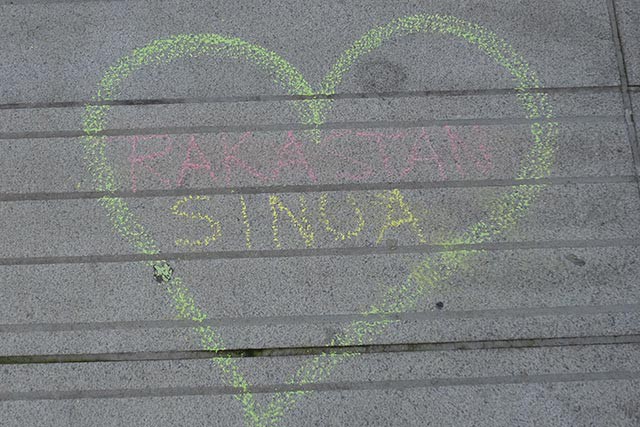
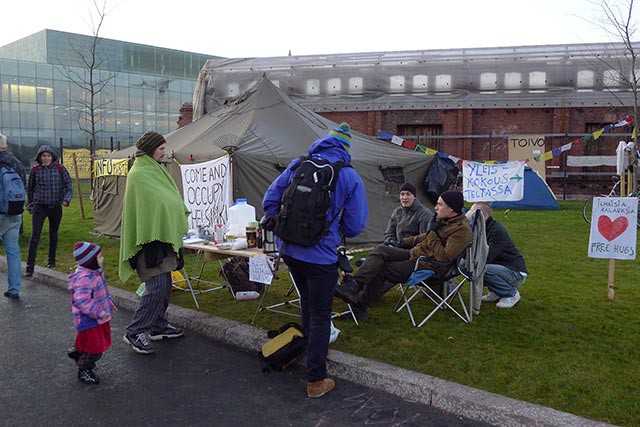
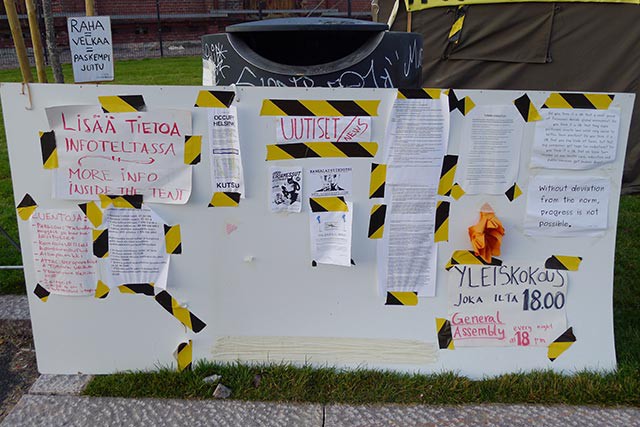
I said hello to a group of people sitting at an information table and told them I was visiting Finland from New York. I was immediately hugged and draped with a fleece blanket by a man in a purple hat named Yanne Kuoppamäki. Helsinki’s camp, like Stockholm’s, had military tents and a generator. It also had a stage for speech-making. Yanne said there were about eight to ten people staying overnight regularly, with about thirty or so joining in the evening meetings. In the meetings, he said, they talked mostly about economic policy, specifically the problems that come when taxpayers in the more prosperous countries in the EU are held fiscally responsible for the economies of countries like Greece. This was a particularly important issue in Helsinki, as Finland is the only Scandinavian country in the Eurozone.
Yanne acknowledged, though, that Finland also has its own problems. He told me that he himself was homeless and unemployed, and he had an eight-year-old daughter. Yanne wanted to see more low-income housing in Helsinki. And one thing that he most wanted to see improved was government support of nutritional food in school cafeterias, and natural health assistance for adults.
“It is a really challenging place to live, in Finland, because of the long winters,” he said, noting that the country has problems with alcoholism and suicide. During the coldest months, Helsinki’s daytime temperatures are around 25 degrees, and during the darkest months, the sun only shines for about six hours a day. “I think that the government should support, for example, Vitamin D treatment for people, that helps with winter depression.”
I asked if unemployment was a problem in Helsinki. “It is,” he said. “But we have pretty good social benefits here. Without them, it would be chaos here. This country would not make it.” (The latest figures show 7 percent unemployment for the country overall in October. The US had 9 percent in the same month.)
Yanne’s message to the protesters in New York was to be careful to keep their movement “peaceful and loving,” and also to be careful of how they were perceived, and careful that their collective name was not hijacked. “That’s one of my main themes here, is to keep this a peaceful and loving movement, so that it’s not directed in a negative way.” He was concerned that the Occupy Together website had a red and black color scheme, which are dark and aggressive-feeling colors. “They should be smart enough to choose the colors right, because it gives a strong message,” he said. He preferred the cooler and calmer violet for his signs and chalk-drawn hearts.
Like Naima, Yanne said the police hadn’t bothered the protesters at all. He said that an officer had come by once early on to say that they could stay camped on the lawn as long as the demonstration remained peaceful, and that they hadn’t seen him since. Later, after I had left Helsinki, the protesters posted a video on their website expressing solidarity with Wall Street to coincide with Occupy Together’s “International Day of Action” on November 17th. They marched to the U.S. embassy. (That’s Yanne in the middle, with the hat and the big sign on his chest, the sign that says “Stop the violence — Peace — Love.”)
https://www.youtube.com/watch?v=o3fDn-fgSNg
***
The next stop on my trip was Copenhagen, and I visited the city’s Occupy camp in the courtyard of the beautiful and stately City Hall. When I arrived in Denmark, the unemployment rate was 4.2 percent. The temperature was in the thirties, and Maja Vestergaard was literally shivering the entire time I talked to her. She said police had arrested her and a few other protesters one night for an illegal bonfire, but after a night in jail they came right back. (A video uploaded to YouTube in late October shows Danish police dismantling the first iteration of their camp.) Another occupier, named Amos Spenner, said he might leave temporarily to go back into the forest, where he and some other protesters were living high in trees to try to stop developers from cutting down wide swaths of the forest to make way for a wind farm.
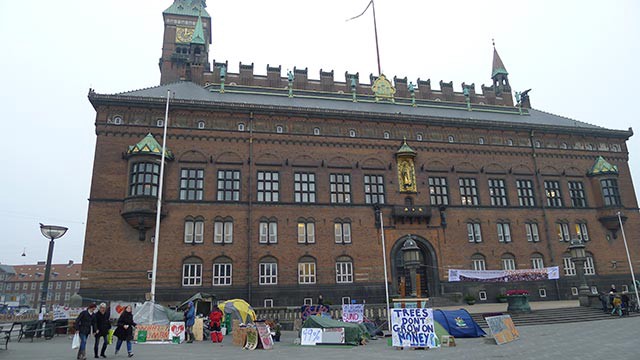
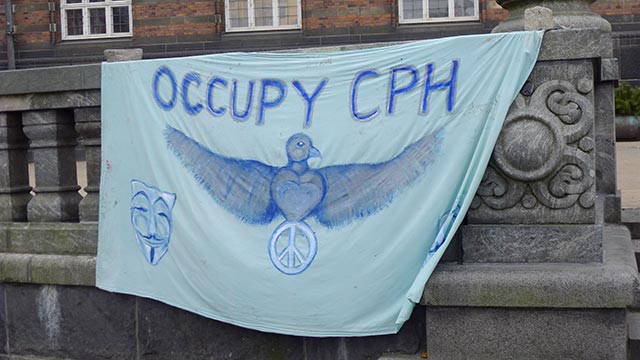
When I asked Maja and Amos what kinds of changes they’d like to see in Denmark, they explained how they thought direct democracy would be possible, if only the outdated government structure would allow it. By using Internet technology, they argued, it would be easy for everyone to vote online and collectively construct policy. They questioned the need for parliamentary representation. “People often say, ‘Yeah, but there’s no alternative, what’s your suggestion?’” said Maja. “There’s a lot of suggestions, but if you ask the politicians, of course they would not let them through, because then they would lose their power.”
I told them of the common conception in the US of the Scandinavian countries as prosperous and peaceful, socialist utopias without the extreme income disparity we have at home. Amos said he thought that the welfare state had the side effect of lulling Danes into complacency. “The people are falling asleep,” he said. “It’s so calm and quiet and nice that most people see it as some kind of movie, like we are in a Hollywood movie here…. Underneath, it’s very close to breaking out — there’s a hole in the balloon.”
After just a few minutes of talking to them I was shivering from the cold, too, and I guiltily speed-walked to a nearby bookstore to thaw my hands.
***
One city I visited that didn’t have a camp was Oslo. As of this year, it was the world’s second most expensive city after Tokyo, and I cursed under my breath every time I had to pay the equivalent of $22 for the cheapest sandwich on the menu. Hundreds of protesters took part in a rally there on October 15, but there wasn’t quite enough momentum to set up a permanent camp.
By contacting the Occupy Oslo Twitter account, I connected with a woman named Siri Klemetsaune. I asked her what the inspiration was for Oslo’s rally, and she wrote “Solidarity, solidarity, and solidarity.”
She added that she and her colleagues were impressed by how far the Occupy Wall Street movement had come in such a short amount of time. “That they were able to build and keep a settlement like that is amazing,” she wrote. “And with every setback they seem to grow stronger. Like when the power-generators were removed, they made eco-friendly bicycle generators.”
The best part of the Occupy Wall Street movement, Siri thought, was the way the occupiers wrote constant updates through social media and kept up communication with protesters around the world, so everyone could feel a part of what was happening back in New York. “They set precedence for every other OWS camp,” she wrote. “When other settlements are somewhat temporary and slightly unstable, it’s even more important that the NYC [camp] works as well as it does. It’s an inspiration for everyone.”
***
Just three days after Siri sent me that email, the NYPD forcibly cleared out the original camp at Zuccotti Park. Other camps in California, Oregon and Massachusetts were raided soon after. When protesters tried to move back into Zuccotti on New Year’s Day, 68 of them were arrested. Shortly after, now back home in Brooklyn, I wrote to everyone I had met in the Scandinavian Occupy camps, wishing them a Happy New Year and asking how things were going. I didn’t hear back from the Copenhagen crew, but I started to see reports online about rising tension between protesters, the Danish police and the general public. Several Jewish news sites and blogs have picked up on a story about one protester having apparently knocked down a large Menorah after a Hanukkah celebration in the public square; as the story goes, he was upset that their camp had been dismantled again for the occasion.
Despite this horrible publicity, among other setbacks, the Occupy Denmark movement continues to hold general meetings and plan events, in front of City Hall and elsewhere. Debate continues on the Occupy Denmark message boards, where one member recently described the movement as having become “smaller,” but “more harmonious” than it had been previously. The Occupy Denmark Facebook page shows a full schedule for January.
I heard back from Siri, who’s still holding down the Occupy Oslo Twitter feed. There’s still no physical camp in Oslo, but she said she feels there is a growing awareness of and sympathy for the movement among Norwegians. There’s a movement now to reexamine President Obama’s Nobel Peace Prize — Oslo protesters “have been promised a formal answer from the director of the Nobel committee,” she wrote, adding, “Though an actual revocation of the Nobel Prize is not likely to happen, it’s important to be able to have that discussion, which we did not have before.”
Siri said it was discouraging to watch the camp at Zuccotti Park get torn down, but that she was nevertheless impressed at how the original OWS crew is able to continue holding meetings and keep the movement going nevertheless. She also said, “These days, our main focus and encouragement is on Occupy Congress, January 17th, and I feel that united efforts of OWS are the strength carrying it all.”
The most surprising updates I got were from protesters in Finland and Sweden — surprising simply because they’re still out there. A vicious winter storm named Dagmar ripped across both countries on the day after Christmas, knocking down trees and power lines and shutting down trains for several days. In the past week, temperatures in Helsinki have dropped to the teens, and to the low twenties in Stockholm. The sun sets each day around 3:30 in the afternoon.
Yet an update from Yanne in Helsinki in December was upbeat — the police remained helpful and sympathetic, occupiers had gotten some positive attention from the local press, and visitors from other camps in Finland had been working with them on various projects and demonstrations. “Things are well at the Camp-Helsinki, we have some improvements,” he wrote, “for example we got a mobile sauna.” A post on the camp’s blog invited everyone in the area to an “Alternative Xmas Party” at the camp on Christmas Eve, where the protesters would provide rice porridge, gingerbread cookies, non-alcoholic mulled wine, and the sauna trailer. Guests were invited to bring a dish to share, “especially ham and rye bread.”
Yanne wrote again a few days ago, saying that the camp was still going strong in the new year, despite the challenge posed by the recent storms and the cold. “The winter has been rough,” Yanne writes in his latest note. “But Finns are used to harsh weather 🙂 we defeated the Russians and all you know :)”
The Occupy Stockholm camp, according to Naima, is still going, too. There are fewer people regularly sleeping there overnight — she says there are about five to ten of them now — but more people come to their regular meetings. It’s still illegal to camp outdoors in the city, and it’s illegal to build a bonfire in a public park, but Naima said the police don’t ever ask them to leave — they just come by to check on the campers and warm their hands by the fire. “Feels like we are the only occupiers in the world having it this easy,” Naima writes.
Of course, the weather hasn’t been easy on them. They had to rebuild a lot of the larger tents after Dagmar came through three weeks ago. “A lot of the campers did not sleep well for many nights,” she wrote. “And also all daytime was dedicated to building our tents stronger to be able to get through the next night.”
They’ve been camping out ever since the first big global protest on October 15. It’s been almost fourteen weeks — four and a half months. I asked Naima what was, to me, the obvious question. She answered: “Of course it is all still worth it! Even if it’s just one single person that changes his mind because of something we do, I feel it’s worth it.”
She talked about how protest tactics could adapt to changing situations — for instance, without the logistics of a physical camp to worry about, the Occupy movement in the U.S. could now focus on expanding their networks in different ways that aren’t dependent on one particular space. And the methods of spreading the message will be different in every city and in every point in time. I asked her what she and the other Stockholm protesters wanted to say to protesters here. She wrote: “I guess our message to New York City is that they should keep going.”
Related: The Struggle For The Occupy Wall Street Archives
Lauren Kirchner is a freelance journalist based in Brooklyn who has lately learned to love pickled herring.
This Man Will Embarrass Mitt Romney on National TV for You
by Abe Sauer

“Look at my picture and ask yourself ‘Would he really do that for money?’ YOU CAN TELL I WOULD!”
That’s how Ron D. of Loudon, Tennessee, described the seriousness of his eBay listing, which was called “I will embarrass Mitt Romney on national TV for money.”
What would your high bid buy? “The possibilities,” the seller said, “are endless… As long as it isn’t against the law, I’ll do or say whatever you want until someone comes and drags me away. And it will take a few of them. I’m a biggun.” Bidding started at one penny.
The entirety of Ron’s eBay listing read:
“Because of people like Mitt Romney, I’m havin’ a hard go of it right now. I got laid-off like the rest of the world. It’s not Obama’s fault. It’s because of landmines buried in the past by G. W. Bush and others likened unto his kind. If elected, Romney is going to be Bush Jr. all over again. When he visits Tennessee on the campaign trail, I’ll fill a balloon with whipped cream, and while he’s signing it for me, I’ll stick it with a pin and bust it and get it all gommed up in that Clark Kent doo he’s sportin’, and it will all be televised on the national news. I’ll sign a contract saying if it isn’t televised on national TV, you don’t have to pay me. Look at my picture and ask yourself ‘Would he really do that for money?’ YOU CAN TELL I WOULD! The possibilities are endless for the highest bidder. As long as it isn’t against the law, I’ll do or say whatever you want until someone comes and drags me away. And it will take a few of them. I’m a biggun. 6’2” and about 255 pounds. I’m going to start this auction at 1 cent, and see where it goes. Messages on this subject are not only welcomed, but encouraged, so drop me a line and tell me what you think.”
We went to chat to learn more.
Me: What were you doing before you got laid off and how long have you been out of work?
Joe The Greenskeeper: I’m Joe The Plumber’s cousin, Joe The Greenskeeper. I guess when people had to choose between golfing and surviving, they sold their clubs.
Me: Obama loves golfing. Have you looked for other work?
Joe The Greenskeeper: I took a job the day I was laid off, delivering pizza 4 nights a week. I’m also selling everything I can on eBay, and doing odd jobs. I never said I was starving or losing my home. Fortunately everything is paid for, but I’m still struggling on a lot less than i was making.
Me: Why Romney? Why not Gingrich or another candidate? Do you think Romney’s plan to create jobs will help?
Joe The Greenskeeper: The auction offer is sincere. I chose Romney because he’s made millions at the expense of others. The way Bain operated was to take over a company already struggling, pay each other HUGE management fees, consulting fees, and bonuses, knowing all along the plan was to run up the bills, bankrupt it all, and move on. Not only was he costing people their jobs, he was screwing the government on the bankruptcy deal. He’s made millions doing this, up to 20 million in one day. So, no I don’t believe in his jobs bill. Based on his past record he’s much better and dissolving jobs than creating them, and I wouldn’t vote for him if he was running for whorehouse pooper mopper. I think it’s time for someone to make a few bucks at his expense. As far as people not taking me seriously, I don’t really care. People used to call up Alexander Graham Bell and laugh at him over the phone.
Me: Any serious suggestions?
Joe The Greenskeeper: Sure, leave the personal income tax where it is, the country was doing ok with that rate until the economy tanked. Lower the corporate tax to where manufacturing is profitable again, do that and you create jobs, create more jobs and more revenue will be generated, and eventually the cycle should catch up to itself and things will improve.
Me: Did you vote for Obama?
Joe The Greenskeeper: I did not vote for The ObamaLamaDing-Dong. He’s a nice guy, and I find him sincere, but not right for America at the time, nor is he now. I’m tired of voting AGAINST someone. I want a candidate that i can vote FOR.
Me: Are there any candidates you think you might support?
Joe The Greenskeeper: Not even one of the Republicans are worth a vote. Nor is The O-Bomb. I’d vote for Pat Paulsen if he was still alive. Remember his campaign slogan? ‘We’ve upped our numbers, now up yours.’
Me: The original Colbert. Sounds like Stephen can count on you for a write-in? You seem to have given up on the political process.
Joe The Greenskeeper: I’ve not given up on the political process forever, just until 2016.
Me: Do you think it will be better by 2016?
Joe The Greenskeeper: I don’t think it will be better by 2016, but that’s the next opportunity for America to do something about it.
After a day, eBay pulled the listing. Ron said it was “because eBay felt I wasn’t really selling a product or a service, but a political opinion.” Sounds like there’s a good chance he might get back on and re-list his services for hire on eBay, if he abides by certain rules. But meanwhile, he still needs the money, so the offer stands. You can email him at rollingstoned@bellsouth.net.
Abe Sauer is the author of the book How to be: North Dakota. He is on Twitter. Email him at abesauer @ gmail.com.
Welcome Back Tuberculosis
“HEALTH officials are paid to feel apprehensive. For some years they have feared that tuberculosis (TB), an ancient scourge tamed by modern drugs, might evolve into a new, indestructible state. New strains of mycobacterium tuberculosis have already emerged, some resistant to isoniazid and rifampicin, two of the best known treatments, and some resistant to additional injected drugs. The advent of completely resistant TB seemed inevitable. Now it may have arrived.”
Australians Foulmouthed
“A snack maker in Australia has won approval to call its product ‘Nuckin Futs’ after authorities accepted the f-word was part of the country’s vernacular.”
Quit Your Job! A Q&A With Actress-Turned-Pot Farmer Heather Donahue
by Michelle Dean

Heather Donahue, best known as the actress from The Blair Witch Project, has written a book. Now this happens all the time, the once-famous-people-writing-books thing. And often the result is some cookie-cutter “memoir” of which the kindest remark you might make is that it has paid some deserving freelancer’s rent for six months. But Heather Donahue’s story caught my eye, regardless, because her book, Growgirl, was said to be about her quitting acting to grow pot. Medical marijuana, of course, all sanctioned by California law, but pot nonetheless, and, being self-interestedly attracted to stories of people who do about-faces in their careers in their early 30s, I was intrigued.
I’m not sure what I expected, but
Growgirl is pretty wonderful. Donahue is not only a funny, sharp, endearing narrator, she’s downright wise about the experience that is, literally, torching a previous life. (Donahue burned a lot of her leftover Hollywood things in the desert before heading north to start her new business.) As a bonus, I learned a hell of a lot I didn’t know about pot. Here we talk about the “lady zeitgeist,” making peace with “tit whiskers” and the waves of fear that come with Quitting Your Job.
Michelle Dean: At the outset of your book, you write that, “I’m sure somewhere on the cover of this book will be the words The Blair Witch Project, and believe me, I will have tried to prevent that.” Plainly, you lost that battle; the movie is on there. How do you feel about that?
Heather Donahue: My publisher’s first idea for the book cover was basically a reenactment of the Blair Witch confessional scene with a pot leaf on my face. Which felt, um, wrong. So we worked from there. I offered the idea of me, naked with a pot plant, thinking that there was no way they were going to go for it.
As far as books that have their author on the cover go, I like it. I like that it’s nudity, because it’s a very naked kind of book, but it’s a sort of desexualized nudity. It’s a little bit Eve, a little bit Green Tara and a little bit Dove ad. The photographer, Michele Clement, got what I was trying to do and I love the photograph we ended up with.
I just never thought of Growgirl as the kind of book that has its author on the cover. The only book of that ilk that I own is Dolly Parton’s autobiography, because she is awesome. It was more than a little heartbreaking to see the cover mock-up and think, I probably wouldn’t pick this up in a bookstore. At some point, I just let it go and started hoping hard that word of mouth will make up for it.

Oh my god, that first cover idea is kind of horrifyingly smart in a crass marketing way.
The first cover idea is good if we’re talking about a brand, rather than a person. A brand doesn’t evolve in the same way that a person does.
Part of me thinks that I should have written Growgirl pseudonymously and then there would have been no possibility of packaging it as a non-celeb celeb memoir. But then it wouldn’t have really been my story.
The Blair Witch Project continues to repeat on me like cucumbers or chili. I understand why it ended up in the subtitle. I understand why it’s the initial focus of the press coverage. It’s such a weird thing, in terms of its effects on my life: not bad, not good; just big.
Your Dove ad analogy strikes me as apt. Not just because the visual cues are the same, but also because it represents the kind of tightwire you have to walk. You want people to read the book (or feel better about themselves) so you have to sell it. But there are all these pre-set ideas about what kind of things sell that are hard to overcome (i.e., books with their authors on the cover), and some of them end up misrepresenting your work. Because I wouldn’t call your book a Dove ad, either. It’s too raw for it.
I agree that the book is much, much rawer than a Dove ad, but in some ways it’s also more innocent — less concerned with branding, but more concerned with empowerment. One of the big narrative drivers for me is the tension between binary pairs: legal/illegal, public/private, revulsion/attraction, etc.
I understand that a lot of people wouldn’t have that money. I understand that it’s a privilege to change a life. But I also understand that what really changed my life was my decision to write every day, which cost nothing.
Some people have commented that some of the more revolting physical stuff [in one sequence, gastrointestinal issues result from the excessive consumption of energy drinks; in another, she worries about hair growing on her breasts, dubbed “tit whiskers”] is gratuitous, but I would suggest my preoccupying ideas in Growgirl are around identity — and that to get to identity we have to go through the body. As I was all up in my cozy little forest chrysalis, I started to realize how I’d started to become charmed and almost impressed at my body’s adaptations, the attractive ones of losing weight and toning up from all the farm work, and also the revolting ones of callouses and blisters and burning and peeling. Having a good relationship with my body, tit whisker and all, had maybe the most significant effect on my overall happiness. That was why I chose to be naked on the cover, that’s why I chose to be completely naked at the shoot, even though you wouldn’t be able to tell. I was also 165 pounds and a size twelve at the time of that shoot. I think I look pretty fucking lush.
I love that “tit whisker,” which is one of the metaphors that opens the book. I mean, talk about a bodily experience women are afraid to talk and be whimsical about: hair growing on areolae is definitely still in that category. Women are only allowed to talk about their bodies, it seems, to the extent it can be commodified and resold, like the Dove ad.
Ah yes, anal bleaching is okay, but tit whiskers are verboten. So it goes. At the risk of sounding all women’s studies-y, I think the commodification of ladybodies has been more disempowering than any other financial, or social restrictions, because how can we be strong and steady enough to exercise our power when we’re frittering it away by wrestling against our own skins? And really, fuck that. As I teeter on the brink of middle age, I feel better than ever. I am acutely aware of my declining fuckablilty, and my initial struggle with that has largely passed and given way to a softness and humility that has made me fearless.
It fits into a certain tradition of these books, and so I have to bring this up: are you an Eat, Pray, Love fan? I think your quest differs considerably from Elizabeth Gilbert’s, don’t get me wrong, but there’s an analogy here that’s inescapable: media-driven job, longing for something with more spiritual/meaningful calories in it…
I think it’s funny that you’re the first person to bring up Eat, Pray, Love, because I think that book gets a bad rap (phenomenal success will do that to a media nugget, I should know!) and I think Growgirl does have a few things in common with it. Fundamentally, they’re both seeker books. I didn’t have money going in, so doing my travels in other countries was out of the question. I had to get domestic, and I think it served me at least as well. I think the other thing the two books shared is a flawed and chatty narrator who is sincerely trying to answer the question, “How to live?” and willing to fail and fail again.
I can only really talk out of my ass about Eat, Pray, Love. I’ve only leafed through it, and when I did so I could tell my seething jealousy of the money would interfere with my being able to internalize whatever the book might have to offer. I mean, you write in the book about coming from a working-class background, so the class thing isn’t invisible to you, but I wondered if you had any thoughts about that aspect of it.
There’s nothing like growing up in a working class family where your dad up and loses his union job after 30-plus years and everything that he raised his kids to believe about dreams and hard work and freedom has turned to disillusionment, unemployment and debt. Witnessing that first hand in my family, and seeing its effects only made me want to work harder, but not to line the pockets of some abstract mystery douches, that was what I wanted to avoid at all costs.
When I made a little money from acting jobs, I never left the apartment I moved into when I first arrived in LA and was working as a temp. I stayed there for ten years, until I moved to Nuggettown, because it was rent controlled. That’s a reason I still had something left to get my growroom going. I understand that a lot of people wouldn’t have that money. I understand that it’s a privilege to change a life. But I also understand that what really changed my life was my decision to write every day, which cost nothing. My decision to meditate, even if only for 15 minutes. Those two things have a bigger daily effect on my day than anything I’ve ever bought or rented. They were the seeds of the bigger, more systemic changes. And really, anyone can do either of those things. A little silence goes a long way. And laughing.
Do you like “Enlightened,” too? That’s the other thing your book reminded me a lot of.
I love “Enlightened.” When I first saw it, I got goosebumps because I thought, holy shit, this reminds me of my story too. It’s time. The lady zeitgeist is afoot and not a moment too soon. Did I mention that all the marijuana plants are female too?
I agree with you that a lady zeitgeist is afoot, but there are times when it comes all the way back around the bend and bites us in the ass. I mean, it’s not an unqualified boon, in other words. Exhibit A: you talk in the book, a lot, about the skepticism you held of the woman you call Cedara’s Mama Earth stuff. I found your distrust of it so refreshing and true-feeling; like you say, no New Age bullshit, you’re determined to earn your meaning.
But it did put you in opposition to the “pot wives,” the young women who are, as you put it, “like Beverly Hills trophy wi[ves] with more body hair.” On some level you were frustrated with them for sort of sublimating themselves into supporting their “pot husbands.” Is that fair? I know you told the New Yorker and Reuters that one of them heckled you at a reading.
On the one hand, I was frustrated with the “pot wives” and on the other, I was jealous. Here I was, with all my independence, trying to find my place in the world, and then another, and then another — and there they were, at ease, relaxed, being taken care of. God just typing that, “being taken care of” sounds so nice for a change. Some people have suggested that the treatment of pot wives is misogynistic, but I think just because something is anti-feminist doesn’t necessarily make it misogynistic. In the evo-bio sense, the pot wives had a very clear job to do, to nurture, to nourish, to support, and there are times when I wish my life was like that. There are times when I wish I would have just married in my twenties, had kids and a husband, maybe a house. Is that what you mean about it biting us in the ass?
People have called Growgirl a book about me trying to “find myself.” This feels like a colossally oppressive pile of bullshit to me. I would suggest that I’ve known exactly who I’ve been at each step along my way…
Yes, I was heckled by a pot wife at the Humboldt HempFest. She told me to shut up because I sucked. But how could she not get defensive? I was basically critiquing her choice and reducing her to a checklist. Granted, she could probably check off every single item on the list, but is that fair? The pot wives brought my own questions about my choices into sharp relief. I would have been tempted to go the pot wife route, if I’d seen any 40-year-old pot wives.
The idea of gender intrigued me while I was growing, because my first round grew green testicles under stress. And it struck me that I too, was growing testicles as an adaptation to stress. That I was becoming a sort of social hermaphrodite, capable of competing in a male-dominated field — but at what price? It’s taken me a long while and a lot of sitting to recover my softness, and I still have to remind myself sometimes that there’s strength in that.
What I meant was something like: it seems to me that whenever we get too sure of what women “are,” that’s when feminism of any kind ends up failing us, because all of a sudden you have to be a certain way to qualify for ladyness. And it’s never a compromise: you have to be independent, or you have to be a nurturer. Full stop.
The growing of plant testicles in response to stress is an interesting analogy in that sense, because I can see people wanting to step in and object that toughness bears no specific relationship to testicles.
I absolutely agree with you: When we get too sure of what women “are,” feminism ends up failing. I think this is partly because if we stop talking about what women “are” we don’t need feminism anymore.
I think adaptability is very different from toughness. I mentioned the plant balls more as an example of adapting to stress, how if you adapt to become everything to yourself — it’s hard to remember to need. I think of it as softness, because you’re basic position has to be softness, ease, to be responsive to change.

Well, and as to adaptability, do you ever think about going back to acting? Do you ever regret the “scorched earth” approach” you took to it?
I’ve never thought about going back to acting, but I do enjoy the performance aspects of book tour. And I loved being in the band that I write about in Growgirl.
I came to acting from a love of telling stories; it’s how I understand the world. In that respect, I haven’t changed jobs, I’ve just dug to the core of what I really wanted to do, and, with Growgirl, have finally put something in the world that I’m really proud of and want to share. I love collaboration, but I love that writing a book is not really a collaboration. It’s nice to have something (finally!) about which I can say: this is mine
Sort of an aside: People have called Growgirl a book about me trying to “find myself.” This feels like a colossally oppressive pile of bullshit to me. I would suggest that I’ve known exactly who I’ve been at each step along my way, but I’ve also known that to assume a stable self would have just been to resist change and thwart whatever I was becoming. Why would I do that? That’s not a rhetorical question.
Well, and you ended up leaving pot farming, too, because it was too hard, which I kind of liked. I mean, we’ve talked about Eat, Pray, Love. One of the things that I resent about the cultural narrative attached to it is that it implies that if you just “go after your dreams” everything will, in the end, turn out okay.
Of course everything won’t, in the end, turn out okay. It will turn out very not okay at many, many points in your story. And sometimes it will turn out so great you think your head might just pop right on off. The gut compass is kind of a pain in the ass that way.
I didn’t quit pot farming because it was too hard. Writing a memoir is actually a whole lot harder in a lot of pretty fundamental ways than growing pot. I quit pot farming because I decided I was going to write Growgirl and felt that for the safety of myself and the community, it would be better if I got out. I also fell in love with “Uwe,” who was deathly allergic to cannabis. Weird, right? I like to think of weird shit like that as fate, it helps move my story along. Another reason I quit was because I knew it was hard on my parents, worrying about my safety all the time and feeling like they had to lie to people about what I was doing. I didn’t think that was fair.
You’re right: My formulation of “hard” was clumsy. What I meant was something more like: ultimately whatever benefit you were drawing from it, it wasn’t enough to outweigh the burden.
I really liked the passage towards the end you had where you write that “One thing I will miss about this job is that it was really clear what I was supposed to be afraid of: getting caught. It’s a deep and ever-present fear, but it’s also pretty simple, and it keeps other vaguer and more slippery ones at bay.” I thought that was fantastically smart, and at the same time, it made me wonder if it’s the right approach, to keep your psyche away from those questions. It is definitely the Buddhist/mindful one, at least I think so. And yet the act of writing a memoir is diving right back into them, isn’t it? Or was it for you?
I think your new formulation of “hard” is more apt. And also a pretty good metric for when it’s time to let go of something: job, town, boyfriend, cheese.
The work did put the more existential worries to the side in the sense that they were more abstract, and weren’t the triggers. It’s just that they weren’t what triggered the fear tsunami, the more immediate and visceral fears were. Of getting caught, of spider mites, etc. The abstract stuff just compounded those more immediate and realistic fears until it hit critical mass and imploded, then passed. The repeated experience of those terror tides made me more skillful when I finally put on my authorial captain’s hat. Is that a heavy-handed metaphor? Yeah, probably — but it’s also the most concise way I know how to put it.
My garden was a metaphor to a sometimes irritating degree. As goes the grower, so go the girls. [“The Girls” is how pot growers refer to their marijuana plants, who are, remember, all female.] A dog reveals the heart of its master, too. The Girls and the dog were my mirrors, every step of the way. I lost my ability for fiction, thanks to them. When I was fucking up, losing my equanimity to chaos, they let me know instantly.
Interview condensed, edited and lightly reordered.
Michelle Dean writes in a lot of places, now. Follow her on Twitter.
Jay-Z Sure Says "Bitch" A Lot
“Some TIME writers and I combed through the lyrics to Jay-Z’s 15 studio albums (both solo and collaborative) and this is what we’ve found: 109 out of 217 songs contain the word ‘Bitch.’ That’s 50.2% of Jay-Z’s entire lyrical output. Hova’s bitchiest album appears to be 1998’s Vol 2…Hard Knock Life, on which 71% of the songs feature the newly illicit B-word.”
